Profile: Kaing Guek Eav a.k.a. Duch
Alleged torture camp chief is first Khmer Rouge leader to be tried by UN-backed tribunal.
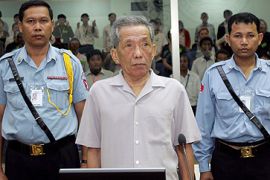
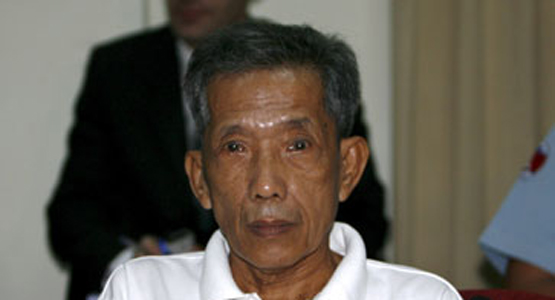 |
| Duch is accused of overseeing the torture and killing of thousands at S-21 [EPA] |
Kaing Guek Eav, also known as Comrade Duch, is the first former senior member of the Khmer Rouge to stand trial for the group’s crimes during their rule over Cambodia in the 1970s.
Held in detention since 1999, Duch was indicted in 2008 for allegedly overseeing the torture and killing of more than 12,000 men, women and children when he headed the S-21 prison camp housed in a former Phnom Penh high school known as Tuol Sleng.
Although only a relatively small proportion of the estimated 1.7 million victims of the Khmer Rouge died in the camp, what happened at Tuol Sleng has come to epitomise the brutality of their rule.
Born in 1942, and trained as a mathematics teacher, Duch was first drawn towards communist ideology by a group of Chinese exchange students at the University of Phnom Penh.
Arrested by police in the late 1960s under the rule of Cambodia’s then king, Norodom Sihanouk, he was jailed for “communist activities” and was held without trial for several months.
Interrogation techniques
After Sihanouk was overthrown, Duch was released and fled to a mountainous region close to the Thai border where he joined an opposition communist party that would later evolve into the Khmer Rouge.
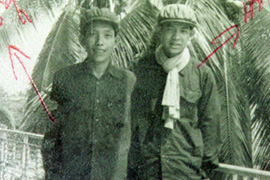 |
| Duch, left, ran one of the most brutal instruments of Khmer Rouge rule [AP] |
Appointed initially as a prison commandant, he gained the trust of his superiors and was put in charge of security, developing his interrogation techniques used to extract confessions from perceived enemies.
Following the Khmer Rouge takeover of Cambodia in 1975, he set up a network of prisons in Phnom Penh and across the country, the most feared being S-21.
Few prisoners taken to S-21 left the camp alive.
The earliest documents connecting Duch with S-21 date from October 1975.
His name is on many execution documents, including one ordering the deaths of 17 children whose parents were accused of being spies.
His work so impressed the top ranks of the Khmer Rouge that he was appointed head of the ruthless Santebal, the group’s internal security organisation.
On the four years of Khmer Rouge rule, thousands of people were taken to the interrogation centre, where they were chained to metal beds, tortured into making confessions and executed in a nearby field.
Only seven are thought to have survived.
Duch himself is thought to have lived close to S-21 with his family and he remained at the prison until 1979, finally fleeing just hours before the invading Vietnamese army captured Phnom Penh, forcing the Khmer Rouge from power.
Identity uncovered
What happened to Duch after the Vietnamese invasion is unclear, but he is thought to have regrouped with other Khmer Rouge cadres near the Thai border, and worked in a number of refugee camps.
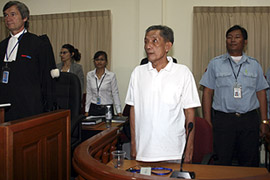 |
| Duch has been held in detention since 1999 [Reuters] |
His failure to destroy evidence of Khmer Rouge crimes at S-21 is thought to have angered the group’s Brother Number Two, Nuon Chea, who demoted him from his post.
His whereabouts were unknown until April 1999, when Nic Dunlop, a American photojournalist, discovered Duch’s past identity.
In the intervening years Duch had converted to Christianity in 1996 after meeting some American missionaries and he had taught himself English.
After Dunlop’s interview with Duch was published in the Far Eastern Economic Review, Duch surrendered to the authorities in Phnom Penh.
Indictment
He was detained in a Cambodian military prison and handed over to police custody after a military court had charged him with murder, torture and membership of an outlawed group.
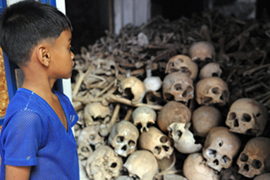 |
| An estimated 1.7 million Cambodians died under the Khmer Rouge [AFP] |
He was formally transferred to the special UN-backed trial for former Khmer Rouge in July 2007.
The indictment against Duch gave a detailed account of the horrific conditions at Tuol Sleng and Duch’s alleged role in the atrocities, saying that every prisoner who arrived there was destined for execution.
“Duch personally tortured and mistreated detainees at S-21 on a number of separate occasions and through a variety of means,” the indictment said.
In some cases, it said, executioners threw victims to their deaths, bludgeoned them and then slit their bellies, or had medics draw so much blood that their lives drained away.
Duch himself allegedly oversaw the atrocities, which included snatching children from their parents and dropping them from the third floor of a prison building to break their necks.